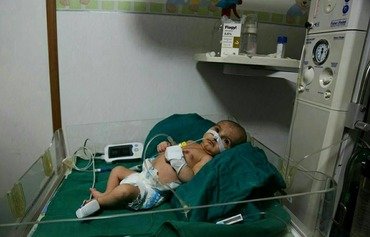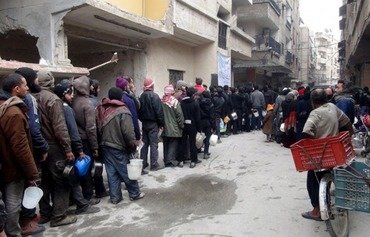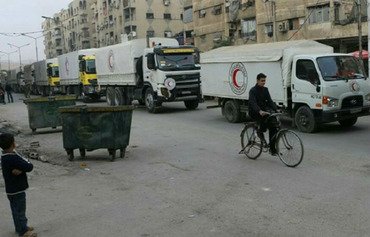Syrian civilians in the Eastern Ghouta region of Damascus tell Diyaruna they are facing difficulties everywhere they turn, as they are trapped by a regime siege and threatened by infighting among rival opposition factions.
Residents have limited access to food and medicine, said Stephane Dujarric, spokesman for the UN Secretary-General, and violent clashes have resulted in "deaths and injuries among civilians and destruction of civilian infrastructure".
"We are very concerned about the safety and protection of more than 400,000 people who are still under siege in the Eastern Ghouta," he said earlier this year.
"The medical situation in the Eastern Ghouta region is catastrophic in every sense," al-Marj medical bureau director Dr. Anas Abu Yassir told Diyaruna.
There is a shortage of vaccines, he said, and the situation is particularly challenging for patients suffering from chronic or incurable diseases.
"There are more than 50 kidney patients in Eastern Ghouta and they are being treated with only four [dialysis] machines, two of which work intermittently due to repeated breakdowns," he said.
The last batch of medical supplies for the treatment of kidney disease was brought in last year, he said, and two people died of kidney disease in February.
There are no vaccines left for children under the age of five, he added.
Shortage of medicine, food, work
"The people of Eastern Ghouta suffer from a shortage of medicine and food," said Mohsen Kabkab, a farmer from Kfar Batna in Eastern Ghouta.
There is virtually no food in the markets, he told Diyaruna, and what little is available is very expensive as it is brought in from outside the region.
This has forced people to become self-reliant, he said, living off what they can grow on the land and breeding livestock and fowl for meat.
Due to the high price of cattle in the market, he said, a group of families will often collectively purchase and breed them, and distribute the butchered meat equally among them.
In addition to the shortage of food, most people are short of money.
Government employees are not receiving their salaries because they have to go to regime-controlled areas to receive them, which is impossible, Kabkab said.
As for day labourers, he added, "there is no work for them at this time, and if they manage to find work, they are paid in barter for goods, such as vegetables or grain in exchange for the work they do".
Mohieddin Haddad, who owns a grocery shop in Eastern Ghouta's Housh Nasri, told Diyaruna he was forced to close his shop due to a shortage of stock.
"A large number of merchants in the Eastern Ghouta region have followed suit, with the exception of a few who have close ties to elements of armed groups who engage in or facilitate smuggling," he said.
Haddad said he could no longer engage in commerce "because of the incredibly high prices some items are sold for and the weak purchasing power of citizens" who cannot afford to buy them anyway.
Infighting between armed factions
"As if the suffering of civilians as a result of the siege is not enough, armed factions in Ghouta are now fighting among themselves," said activist Mohammad al-Baik of the Eastern Ghouta co-ordination committee.
The rival factions -- primarily Failaq al-Rahman and Jaish al-Islam -- have been engaged in violent clashes that have impacted the area's civilian population, he told Diyaruna.
Armed groups have been detaining civilians who oppose them and activists who try to act and write freely, al-Baik said.
They have closed the offices of a number of human rights and media groups in Ghouta, "such as the Talaana al-Hurriya newspaper, the office of Hurras Network (Child Protection Network), the office of Hurras Network's magazine, the Development Bureau and the Violations Documentation Centre", he said.
Despite the truce that has been in effect, regime forces have been intensifying airstrikes on the region, he said, focusing their fire on the towns of Harasta, Irbin and Duma.
"The displacement of thousands of families from the Western Ghouta region has exacerbated the situation in Eastern Ghouta," al-Baik said.
He said the situation in some of the camps, particularly al-Marj, is disastrous.
The camp receives minimal assistance, he said, as UN aid organisations have not been able to enter the region in a long time, and as most private organisations have suspended their operations due to the actions of armed groups.

![A Syrian girl holds her little brother outside at tent in al-Marj displacement camp in the Eastern Ghouta region of Damascus. [Photo courtesy of media activist Adham al-Sherif]](/cnmi_di/images/2017/04/11/7557-Syria-east-ghouta-600_384.jpg)






